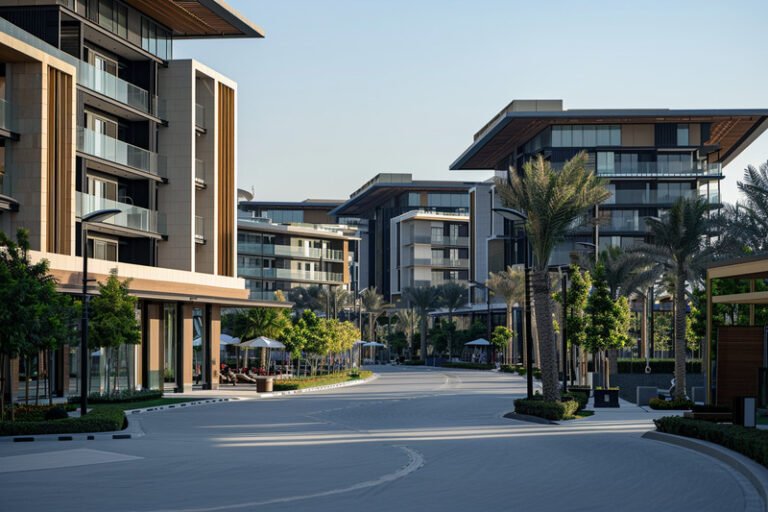Understanding the Property Appraisal Process

Property appraisals are crucial in Dubai's real estate market. Whether buying, selling, or refinancing, understanding this process is key to making informed decisions.
In Dubai's dynamic market, appraisals go beyond simple price tags, considering unique factors that influence property values. From luxury apartments in Downtown Dubai to villas in Palm Jumeirah, each property requires a tailored approach.
Appraisals take into account location, amenities, market trends, and Dubai's specific regulations. This comprehensive evaluation helps ensure fair transactions and compliance with local laws.
For first-time buyers and experienced investors alike, grasping the nuances of Dubai's appraisal process is essential. It can save time, money, and potential headaches in future transactions.
Let us help you find the perfect property. Contact us to get started.
Let's explore the key elements of property appraisals in Dubai's distinctive real estate landscape.
Key Takeaways
Property appraisals play a crucial role in Dubai's dynamic real estate market. These evaluations determine the market value of properties for various purposes, including sales, refinancing, and tax assessments. In Dubai's unique landscape of luxury developments and iconic architecture, the appraisal process requires specialized knowledge and expertise.
Licensed appraisers in Dubai evaluate properties by considering multiple factors specific to the emirate's real estate market. These include property size, condition, amenities, location, and proximity to key landmarks or attractions. The distinctive features of Dubai's properties, such as sea views, branded residences, or smart home technologies, also significantly impact valuations.
The appraisal process in Dubai typically involves three main steps: property inspection, market data analysis, and application of valuation methods. During the inspection, appraisers assess the property's condition, features, and any recent upgrades or renovations that could affect its value.
Market data analysis in Dubai requires a deep understanding of the city's diverse neighborhoods and property types. Appraisers examine recent sales of comparable properties, current market trends, and factors like upcoming developments or infrastructure projects that might influence property values.
Appraisers in Dubai employ various valuation methods, often combining them for greater accuracy. These include the sales comparison approach, cost approach, and income approach. The choice of method depends on the property type and available market data.
Challenges in Dubai's property appraisals include valuing unique architectural styles, luxury amenities, and navigating complex regulatory frameworks. The city's rapid development and constantly evolving skyline also require appraisers to stay updated on market changes and upcoming projects that could impact property values.
What Is a Property Appraisal?
In Dubai's dynamic real estate market, property appraisals play a crucial role. These professional assessments determine a property's market value, essential for transactions like sales, refinancing, and tax assessments. Whether you're buying a luxurious penthouse in Dubai Marina or selling a villa in Palm Jumeirah, an appraisal provides an unbiased evaluation of the property's worth.
Licensed appraisers in Dubai conduct these assessments, leveraging their expertise in the local market. They consider factors unique to Dubai, such as proximity to landmarks like Burj Khalifa or access to metro stations. The process typically involves a property inspection and analysis of comparable sales in the area.
The appraiser examines the property's size, condition, and amenities. In Dubai, features like sea views, smart home technology, or branded residences can significantly impact value. They also consider the property's location within Dubai's diverse neighborhoods.
After gathering data, the appraiser compiles a detailed report. This document outlines their analysis and provides a professional opinion on the property's current market value in Dubai's real estate landscape.
It's important to note that an appraisal differs from a property inspection. While inspections focus on the condition of a property, appraisals determine its market value in Dubai's competitive real estate market.
The Role of Appraisers
Appraisers in Dubai are crucial to the emirate's dynamic real estate market. These unbiased experts evaluate property values, providing essential insights for buyers, sellers, and lenders. Using their extensive knowledge of local trends, market conditions, and valuation techniques, they establish fair and precise estimates of a property's worth. Their role is particularly vital in Dubai's diverse property landscape, ranging from luxury high-rises to traditional neighborhoods.
During real estate transactions in Dubai, appraisers conduct thorough inspections of properties. They examine physical condition, size, and unique features while considering the property's location within the emirate. Appraisers also research comparable properties in Dubai to set valuation benchmarks.
Factors such as proximity to key Dubai landmarks, recent sales data in specific neighborhoods, and current market trends in the emirate all contribute to the appraiser's assessment. This comprehensive approach ensures an accurate valuation in Dubai's ever-evolving real estate scene.
Appraisers in Dubai provide detailed reports with in-depth information about the property and their valuation methodology. These reports are often required for mortgage approval by UAE lenders and can be used in negotiations between buyers and sellers in Dubai's property market.
Dubai's appraisers adhere to strict ethical standards and maintain objectivity throughout the process. This commitment to fairness and accuracy is essential in Dubai's diverse and competitive real estate environment, where property values can vary significantly across different areas and property types.
Steps in the Appraisal Process
Dubai's real estate appraisal process follows a structured approach to ensure accurate property valuations. This process is crucial for various purposes, including buying, selling, refinancing, or obtaining insurance. Understanding these steps can help property owners, investors, and other stakeholders navigate the appraisal process more effectively in Dubai's dynamic real estate market.
The initial consultation kickstarts the appraisal process in Dubai. During this step, you'll discuss the appraisal's purpose and provide essential property information to the appraiser. This helps set the groundwork for a thorough evaluation.
Next, the appraiser conducts a comprehensive property inspection. They examine the property's condition, features, and any recent improvements or renovations. This on-site assessment is crucial for an accurate valuation.
The third step involves gathering and analyzing market data. Appraisers research recent sales of comparable properties in Dubai, current market trends, and local economic factors. They also consider the property's location, zoning regulations, and future development potential.
Appraisers then apply various valuation methods tailored to Dubai's real estate market. These may include the sales comparison approach, cost approach, and income approach. Each method helps determine the property's fair market value in the context of Dubai's unique market conditions.
Factors Affecting Property Value
Dubai's real estate market is influenced by various factors that shape property values. Location remains paramount, with prime areas commanding premium prices. Property condition, size, and modern amenities significantly impact valuations. Economic conditions, including interest rates and market trends, play a crucial role. Local developments, such as new infrastructure projects or commercial hubs, can boost nearby property values. The age of the property, zoning laws, and future development plans in the area are also important considerations.
In Dubai, unique features like private pools or stunning views of iconic landmarks can substantially increase a property's worth. The city's rapid development means that newer constructions often hold higher value due to modern features and lower maintenance requirements.
Dubai's cosmopolitan nature attracts a diverse range of investors, influencing demand for different property types. The emirate's tax-free status and residency visa options tied to property ownership are additional factors affecting values.
Recent sales of comparable properties in the area serve as crucial benchmarks for appraisers. Dubai's real estate regulatory framework, including initiatives by the Dubai Land Department, also impacts market stability and property valuations.
The city's ambitious projects, such as the Dubai 2040 Urban Master Plan, can significantly influence long-term property values in specific areas.
Types of Appraisal Methods
Understanding Dubai's unique property market is crucial when exploring appraisal methods. The emirate's rapid development, international appeal, and diverse property types require specialized valuation techniques. Three main approaches are used: sales comparison, cost approach, and income approach. Each method considers Dubai-specific factors like location, property type, and market trends.
The sales comparison approach is widely used in Dubai. It compares the subject property to similar recently sold properties in the area. Adjustments are made for differences in location, size, and amenities, considering Dubai's distinct neighborhoods and property types.
The cost approach estimates value by calculating the cost to rebuild the property, plus land value, minus depreciation. This method is useful for new developments in Dubai's expanding areas or unique properties like palm-shaped island villas.
The income approach is crucial for Dubai's investment properties, including commercial buildings and holiday homes. It analyzes potential income, expenses, and capitalization rates, factoring in Dubai's tourism-driven rental market.
Appraisers in Dubai often combine these methods to provide accurate valuations, considering the emirate's dynamic real estate landscape and diverse property portfolio.
Appraisal Reports Explained
Appraisal reports in Dubai's real estate market are comprehensive documents detailing a property's value, characteristics, and valuation methods. These reports are crucial for understanding the worth of properties in the emirate's dynamic market.
The report begins with key details like the property’s address, valuation date, and appraisal purpose. It then provides an in-depth description of the property, including physical attributes, location, and unique features. The report also includes an analysis of recent comparable sales in the area to support the valuation. Additionally, it offers recommendations for improvements or repairs that could potentially increase the property’s value. Lastly, the report concludes with important viewing property tips for potential buyers or investors to consider when assessing the property in person.
Local market information, recent sales of comparable properties, and current trends affecting property values are also included. This data helps contextualize the valuation within Dubai's real estate landscape.
The valuation analysis section forms the core of the report. It explains the appraisal methods used, such as sales comparison or income capitalization, and the appraiser's reasoning behind them.
Supporting documentation, including photographs, maps, and relevant market data, is provided to substantiate the appraiser's findings. This ensures transparency and credibility in the valuation process.
Challenges in Property Appraisals
Property appraisals in Dubai face unique challenges due to the city's dynamic real estate landscape. The rapidly evolving market makes establishing accurate valuations difficult, with property values fluctuating quickly.
Dubai's distinctive architectural styles and luxury amenities further complicate assessments. The scarcity of up-to-date transaction data hinders finding suitable comparable properties. Additionally, the city's diverse freehold and leasehold arrangements significantly influence property values. Cultural factors arising from a mix of local and international buyers impact pricing and desirability.
Appraisers must navigate Dubai's complex real estate regulations and zoning laws, which can substantially affect property values and development potential. Staying informed about these ever-changing rules is crucial for accurate assessments.
The city's ambitious development projects and mega-events, such as Expo 2020, create market fluctuations that appraisers must consider. These factors can lead to rapid changes in neighborhood desirability and property demand.
Dubai's unique geographical features, including man-made islands and desert developments, present additional challenges in determining comparable values across different areas of the emirate.
Appraisals in Different Real Estate Transactions
Dubai's real estate market presents unique appraisal scenarios across various property transactions. Whether buying a luxurious apartment in Downtown Dubai, investing in commercial spaces in Business Bay, or refinancing a villa in Palm Jumeirah, understanding the nuances of appraisals is crucial. The Dubai Land Department oversees property valuations, ensuring transparency and fairness in the emirate's dynamic real estate sector. From residential to commercial properties, each transaction type requires a tailored approach to appraisal, considering factors specific to Dubai's market dynamics.
When purchasing a property in Dubai, lenders typically require an appraisal to verify the value aligns with the loan amount. This protects their investment and helps buyers avoid overpaying in a market known for its premium properties.
For refinancing in Dubai, an appraisal determines the current market value of your property. This impacts your loan-to-value ratio and potentially affects your interest rate, considering Dubai's unique financing landscape.
Commercial real estate appraisals in Dubai are complex, factoring in the property's income potential. Appraisers consider rental income, occupancy rates, and operating expenses, especially in popular areas like Dubai Marina or DIFC.
During divorce proceedings in Dubai, a fair market value appraisal helps divide assets equitably, adhering to local laws and regulations. For estate settlements, appraisals determine property values for tax purposes and distribution among heirs.
Property tax appeals in Dubai are less common due to the tax-free nature of real estate. However, appraisals may be necessary for other government-related transactions or disputes.
Conclusion
Understanding property appraisals in Dubai is crucial for anyone involved in real estate transactions. The process involves professional appraisers who assess property values using various methods tailored to the local market. Dubai's unique real estate landscape, with its mix of traditional and ultra-modern properties, requires specialized knowledge and expertise.
Appraisers in Dubai consider factors such as location, property condition, market trends, and recent comparable sales. They often use the sales comparison approach, income approach, and cost approach to determine fair market value.
The Dubai Land Department oversees property valuations and ensures adherence to international standards. This regulatory oversight helps maintain transparency and reliability in the appraisal process.
Accurate appraisals are essential for buyers, sellers, lenders, and investors in Dubai's dynamic real estate market. They inform purchase decisions, guide loan amounts, and assist in property tax assessments.
Understanding the appraisal process empowers you to make informed decisions and navigate Dubai's real estate market confidently. It helps you assess property values realistically and negotiate effectively in transactions.
Let us help you find the perfect property. Contact us to get started.






